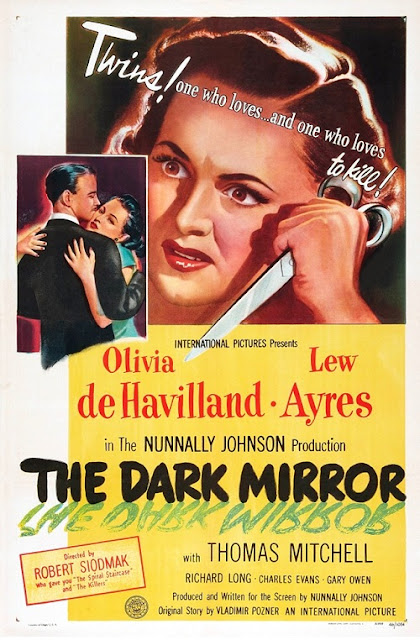by Daniel White
Another example of Hollywood's emerging interest in abnormal psychology, The Dark Mirror (1946), is a gimmicky flick that barely manages to hold the viewer's attention. The film stars Olivia de Havilland as a pair of twin sisters, one of whom is a murderer. The plot revolves around the ludicrous concept that because they are so identical, the police are unable to arrest the guilty sister.
Producer Nunnally Johnson is the main culprit in this lunacy, as he also penned the screenplay from a story by Vladimir Pozen. Fortunately for him, he has ace director Robert Siodmak helming the movie. Siodmak, who cut his teeth working in the pre-Hitler German film industry was a master of Expressionism. Along with cinematographer Milton R. Krasner, they have given The Dark Mirror an effective, shadowy look.
De Havilland delivers a qualified performance as the is-she-the saint-or-is-she-the sinner sibling, but perhaps the actress is a little too ladylike. What this movie needs is a Joan Crawford or Bette Davis extravagantly emoting all over the place. In fact, Davis did tackle a good sister/bad sister role the same year, in A Stolen Life. The film is not much better, but Davis is loads of fun hamming it up as bad sister, Pat.
Expert direction, competent actors (Lew Ayres and Thomas Mitchell acquit themselves nicely in support parts), but the film is sunk by a silly story that defies believability. The Dark Mirror is one more case of why Hollywood never was very compelling when lying on the psychiatrist's couch. Produced by International Pictures and distributed by Universal, The Dark Mirror is available on YouTube.

No comments:
Post a Comment